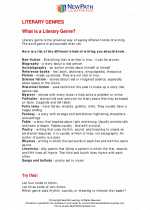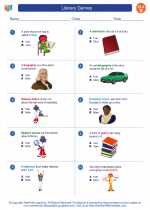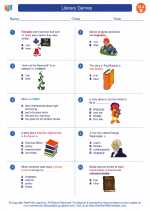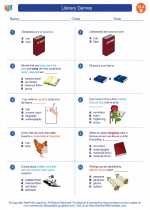Study Guide: Nonfiction
What is Nonfiction?
Nonfiction is a type of writing that is based on real events, real people, and real ideas. It presents information and facts about the world around us.
Types of Nonfiction
Nonfiction can be categorized into various types such as:
- Biographies: A detailed account of a person's life written by another person.
- Autobiographies: An account of a person's life written by the person themselves.
- Essays: Short pieces of writing that express the author's opinion or interpretation of a subject.
- Speeches: Oral presentations that are written down and delivered to an audience.
- Articles: Pieces of writing found in newspapers, magazines, or online that provide information about a specific topic.
- And more...
Features of Nonfiction
Nonfiction writing often contains the following features:
- Factual Information: Presents real and accurate information about a subject.
- Evidence and Examples: Supports the information with evidence and real-life examples.
- Clear Organization: Follows a logical structure and is often organized into sections or chapters.
- Author's Perspective: Reflects the author's viewpoint or perspective on the subject.
Why is Nonfiction Important?
Nonfiction is important because it provides readers with knowledge about real events, people, and ideas. It helps readers to understand the world around them and can be a valuable source of information and learning.
Reading and Analyzing Nonfiction
When reading nonfiction, it's important to:
- Identify the main idea or purpose of the text.
- Look for supporting details and evidence that back up the main idea.
- Consider the author's perspective and how it influences the presentation of information.
- Reflect on the significance of the information and its relevance to the reader.
Activities to Explore Nonfiction
To engage with nonfiction, you can:
- Read biographies or autobiographies of famous figures and discuss their impact on history or society.
- Analyze speeches by influential leaders or thinkers and evaluate their persuasive techniques.
- Research and read articles on current events or scientific discoveries to stay informed about the world around you.
- Write your own nonfiction piece, such as a personal essay or a report on a topic of interest.
[Nonfiction] Related Worksheets and Study Guides:
.◂English Language Arts Worksheets and Study Guides Second Grade. Literary Genres
Study Guide Literary Genres
Literary Genres  Worksheet/Answer key
Worksheet/Answer key Literary Genres
Literary Genres  Worksheet/Answer key
Worksheet/Answer key Literary Genres
Literary Genres  Worksheet/Answer key
Worksheet/Answer key Literary Genres
Literary Genres 

 Worksheet/Answer key
Worksheet/Answer key
 Worksheet/Answer key
Worksheet/Answer key
 Worksheet/Answer key
Worksheet/Answer key

The resources above cover the following skills:
Students read a wide range of print and nonprint texts to build an understanding of texts, of themselves, and of the cultures of the United States and the world; to acquire new information; to respond to the needs and demands of society and the workplace; and for personal fulfillment. Among these texts are fiction and nonfiction, classic and contemporary works. (NCTE)
Students read a wide range of literature from many periods in many genres to build an understanding of the many dimensions (e.g., philosophical, ethical, aesthetic) of human experience. (NCTE)